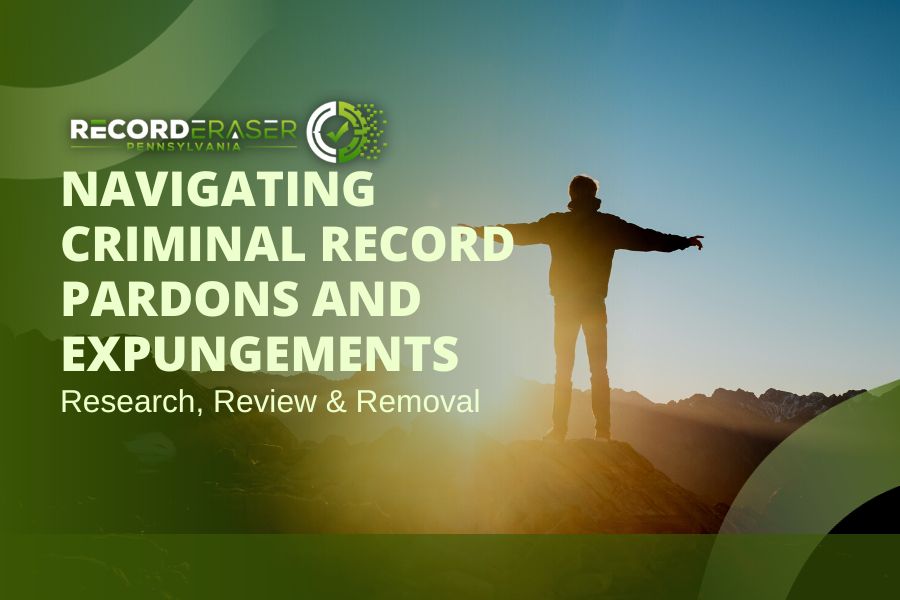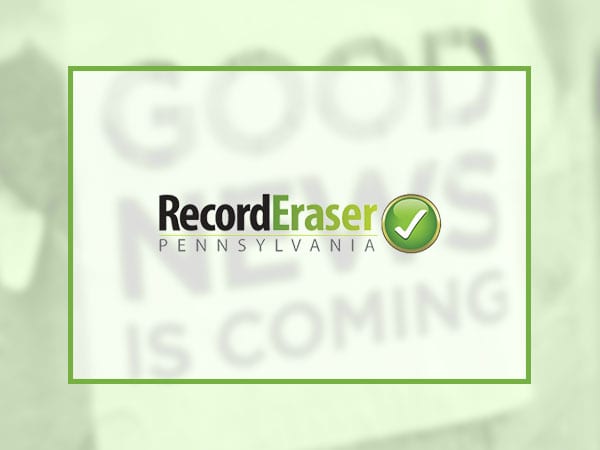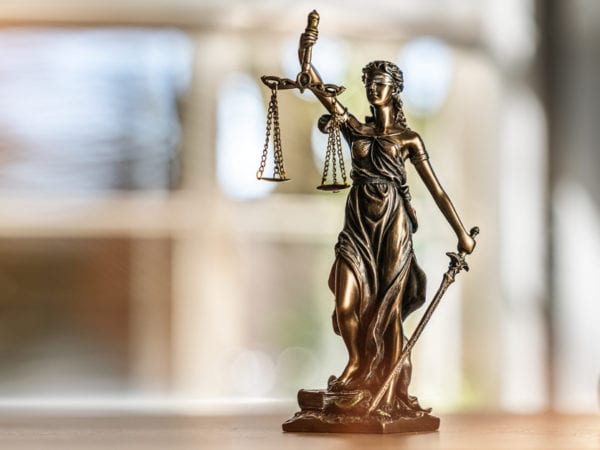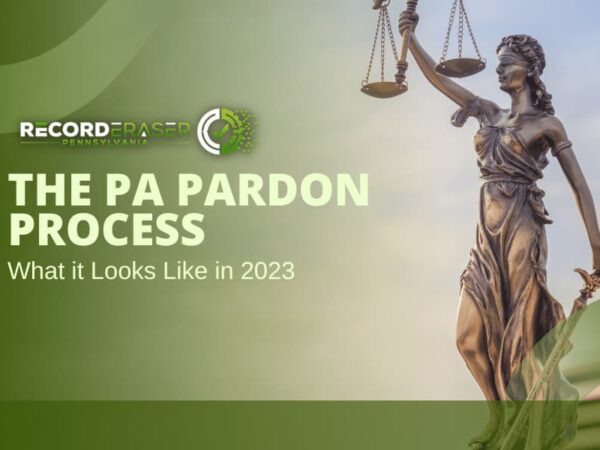
Criminal records can significantly impact an individual’s life. This record could discourage their employment prospects, housing opportunities, and personal relationships. But these records don’t have to stick with you to the grave.
It’s possible to remove criminal records in PA through expungement or pardon. Let’s uncover the processes of obtaining a pardon or expungement in Pennsylvania. This article will shed light on the differences between the two and provide insights into the complex legal landscape.
At Record Eraser, we understand the importance of helping individuals reclaim their lives by guiding them through these critical legal procedures.
Pardons: Seeking Forgiveness and Redemption
The defendant’s party can apply for a pardon in Pennsylvania before the Governor’s Board of Pardons in Harrisburg. The process entails seeking forgiveness from the board for past criminal conduct, explaining why it occurred, and why the applicant is now a good candidate for a pardon. The ultimate goal is to secure three out of five board members’ recommendations, leading to the governor potentially issuing a pardon.
The Pardon Application Process
Applying for a pardon entails several steps that are not too hard to follow and understand. Here’s what you can expect with the process:
- Gathering Court Records: To initiate the process, we gather court records, which are instrumental in helping the applicant answer crucial questions about the crime’s circumstances and their transformation.
- Filing the Application: Once we have the necessary documents, we file the pardon application in the Governor’s Board of Pardons.
- Tracking Progress: We closely monitor the application’s progress over the next one to two years, providing guidance and representation during any hearings or interviews that may occur during this period.
Expungements: Clearing Your Record
Expungements in Pennsylvania offer a quicker way to clear certain types of criminal records. In most cases, expungements are applicable for claims that didn’t result in convictions. However, this process can also apply to individuals who received convictions if they are over 70 years old or received a summary conviction over five years ago.
Unlike pardons, you can only file an expungement in the county where the conviction occurred, particularly in the clerk of courts of common pleas for that county. This unique requirement of expungement may create a roadblock for you.
However, you can expect the entire expungement filing process to conclude within 30 to 60 days. Once done, you can expect the result within approximately three to five months.
Pardons Vs. Expungements: Knowing the Difference
Understanding the critical distinctions between pardons and expungements is crucial to deciding which process applies to your situation. To help you understand the functional difference between the two record-clearing processes, we laid out the differences for you.
When Is a Pardon Applicable?
Compared to the expungement process, pardons are relatively easy to understand. The process can be arduous, but understanding the steps is pretty straightforward.
If you have a felony or a misdemeanor conviction you want to remove from your record, a pardon is needed. As long as you’re dealing with convictions, unless it’s a summary, a pardon is more suitable than expungement. You can request a pardon if you want the court to review your summary conviction in less than five years.
When Is an Expungement Applicable?
Unlike pardons, the steps involved in expungements are more complicated but can be faster. While a pardon may cover up some charges or prevent you from earning hefty convictions, an expungement is what erases your criminal record.
The process entails your party proving why you’re eligible for an expungement, which only applies to eight types of offenses. These crimes are:
- Juvenile Charges: If you committed a crime before you turn 18, you can clear it through expungement. You can initiate this process when you turn 21, as long as you have a clean record for over five years before you file and the district attorney consents to your request. You could also demand a hearing if the district attorney refuses to consent.
- Summary Offenses: If you were arrested for a petty or summary offense (i.e., driving without a license, public intoxication), you can get your record cleaned with expungement. This process only applies if the violation occurred over five years ago.
- Dismissed Charges: Charges that have been nol-prossed, withdrawn, or dismissed can be expunged. In essence, these decisions mean that you were acquitted.
- Accelerated Rehabilitative Disposition: In DUI cases, defendants can undergo an alternative sentencing program called Accelerated Rehabilitative Disposition (ARD). In this program, you will attend classes, serve the community, pay some fines, and expunge your charges after the program’s duration.
- Charges That Have No Disposition: Sometimes, the district judge or the police won’t attach a conviction to your charges. In this event, you can file for expungement after 18 months if there aren’t any dispositions.
- Underage Consumption: This is one of the most prevalent crimes, especially on college campuses. Technically speaking, underage drinking is a summary offense. Under the specific provisions of the expungement code, you can file for expungement once you turn 21.
- Over the Age of 70: As stated earlier, you can file for expungement for your misdemeanor or felony convictions if you turn 70 without getting a pardon from the governor if you’ve been off any supervision for the last 10 years. All you need is a petition, and it can be erased.
- Pardoned Convictions: Ultimately, all convictions that are pardoned can be erased through expungement.
It’s important to remember that the expungement process is driven by statute. You can’t petition a conviction for removal if the law does not indicate it. The clerk of courts will take your filing fee, and you will get your petition denied with no explanation as to why.
Understanding the Criminal Record Process
A clear understanding of how the criminal record process works is essential for navigating pardons and expungements successfully. Let’s explore the criminal record process so you can better prepare for it.
Let’s start at the beginning. When the police investigate a crime, they think they have reasonable suspicion that someone is engaging in criminal behavior. This suspicion will prompt an investigation.
When the police officers have enough information, they’ll draft a criminal complaint and request an affidavit of probable cause. This process will eventually lead to your arrest.
What Happens in the Magisterial District Judge’s Office
When a complaint is filed at the Magisterial District Judge’s (MDJ) office, it results in the assignment of an OTN (Offense Tracking Number.) You will also receive an MDJ docket, setting the stage for a preliminary hearing.
You can plead for the charges lowered to a third-degree misdemeanor or enter a plea deal to a summary offense. District judges can take guilty pleas to misdemeanor threes. But if the allegations are a misdemeanor two, misdemeanor one, or felony grading, the district judge can only send the case to the county courthouse (the common plea level).
This level is when you see Pennsylvania criminal records with comments like “held to court or return to court.” That means the charges were sent to the common plea level for final resolution, which is how people get criminal charges.
Understanding the Bail Process
The district justice level is where the court sets the bail. Bail is a legal monetary requirement for defendants to gain temporary freedom before the preliminary hearing.
Depending on the crime, you can get an unsecured or secured bail.
- An unsecured bail means you can get out without paying bail because you pose little or no risk to the community.
- A secured bail is when you pay the full amount or a portion of it to gain temporary freedom.
What Happens in the Preliminary Hearing?
During the preliminary hearing, you and the police officer who arrested you will appear before the court. The police will justify what they alleged in their criminal complaint, and your attorney can question the evidence presented by the opposing party.
From the magisterial district level, withdrawn charges still leave the criminal complaint on your record. The charges might’ve been withdrawn at the preliminary hearing but remain on your paper until you expunge them.
The Common Plea Level
If a case is pled down to a summary offense and resolved with a guilty plea, you can request expungement within five years or after five years of law-abiding behavior. A district attorney is assigned to the case at the common plea level, working closely with the police and the defendant’s attorney.
The Discovery Phase
At the common pleas level, the District Attorney’s office must share all the evidence they intend to use against the defendant, a process known as discovery. This phase involves the defendant and their attorney filing a discovery motion to request all available evidence, which may lead to case resolution or plea bargains.
The Trial Process
If the district and defense attorneys cannot agree, the case proceeds to trial. The trial involves presenting evidence, cross-examination, and the jury determining whether the prosecution has proven the elements of the crime beyond a reasonable doubt.
How It Applies in Real Life
Understanding these legal processes becomes more accessible when examining real-life scenarios. Here are some sample cases to help you grasp the concept of pardon and expungement in various cases.
Underage Drinking
Trixie Modine, age 22, got caught drinking before turning 21, resulting in a summary offense for underage consumption. Since she is now older than 21, she can request expungement for her juvenile case without a pardon.
Harassment Case
Carter Smith, who graduates in May 2026, pled guilty to summary harassment at a frat party on January 1, 2023. He’s concerned about the impact of his criminal record on job opportunities and can apply for an expungement on January 1, 2028. Alternatively, he could seek a pardon, which would be reviewed in 2025, and subsequently request an expungement.
Simple Assault
Ricky and Christina got into a physical altercation, with Ricky charged with simple assault. Christina withdrew the assault charge after the couple underwent marriage counseling. In this case, Ricky doesn’t have to seek pardon since the charges are withdrawn, and he can file for expungement immediately.
Drug Offense
Hector, who was addicted to opioids when he was 17, had accumulated a series of drug and theft convictions before he was 22. He successfully completed rehabilitation and remained clean for five years. His juvenile charges are qualified for an expungement, while his adult convictions require a pardon followed by an expungement.
How Record Eraser Can Help
At Record Eraser, we provide support and guidance throughout the complex processes of obtaining pardons and expungements in Pennsylvania. Here’s what you can expect from our services:
- Hassle-Free Process: Our team will handle all the groundwork to ensure you are on the right track. Our owner has experience as a defense attorney, so you are in safe and capable hands.
- Transparent Pricing: Since our creation, it’s been our mission to provide honest service to all our clients. Our prices are the fairest you can find within the area with our level of expertise.
- Local Expertise: We know the nuances of the justice system in Pennsylvania and are familiar with laws related to your conviction.
- Supportive Guidance: We don’t just take your case and clear your record. We explain every step, why it’s necessary, and what you should expect throughout the process.
Clearing your criminal record in Pennsylvania is a multi-step process that requires a deep understanding of the law and the specific circumstances of your case. At Record Eraser, we’re dedicated to helping individuals take control of their lives by providing guidance and expertise throughout the entire journey.
Let’s work together to clear your record and pave the way for a brighter future. Contact us today and find out if your past convictions qualify for a pardon or expungement.




